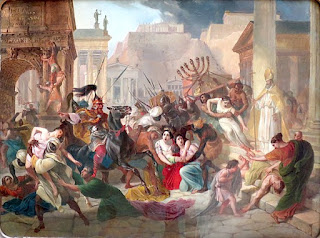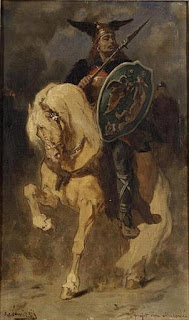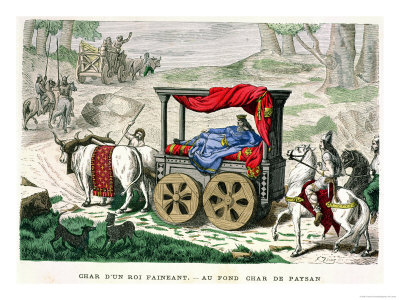He was born in 454CE, right after his people, the Ostrogoths, freed themselves from domination by the Huns after the death of Attila a year before. That was not to say the Ostrogoths were from then on masters of their own faith. His father, Theodemir, made a treaty with Emperor Leo I of the Eastern Roman Empire. One of its conditions was Theodoric's removal to Constantinople as hostage to secure good behavior by the Ostrogoths. (There was also a tribute each year to Constantinople of 300 pounds of gold.)
Theodoric, who was about seven or eight years old, benefitted from this move. Because his father had consolidated lands that had belonged to Theodemir's brothers, the Ostrogoths ruled a large territory, making Theodoric as the next heir a valuable partner for the Empire and someone the Empire wanted to make sure would be a valuable ally in the future. He was therefore educated in reading, writing, and arithmetic by the best imperial teachers and learned far more about the world than he might have otherwise.
Theodoric was returned to his family when he was 15 or 16, and was given command of part of the Osgtrogoth kingdom held by one of his uncles. Shortly after, he proved his value to the kingdom when a Sarmatian king, Babai, attempted to invade an area near Theodoric that was under Constantinople's control. Theodoric with 6000 warriors defeated the invaders and killed Babai.
Theodoric increased his reputation in the 470s by leading military campaigns against enemies of the Goths and the Eastern Roman Empire. When Theodoric was successful against Theodoric the Squinter, a Thracian Goth who had led a revolt against the Emperor Zeno, Zeno rewarded him with command of the Eastern Roman forces.
In 471, he was made King of the Ostrogoths. With this position and the favor of the Emperor Zeno, his star was ascendant. Zeno, however, was a fickle emperor, as we shall see next time.
https://en.wikipedia.org/wiki/Theodoric_the_Great
http://dailymedieval.blogspot.com/2012/08/4-stages-of-gothichistory-culture.html






